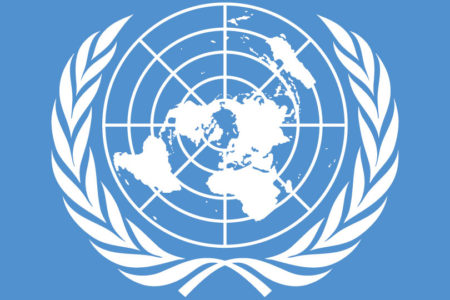Is the Quartet Fiddling the Same Old Tune?
The United States is undoubtedly Israel’s closest ally. Substantial American financial aid is sent to the world’s only Jewish state every year, as it is to Egypt and several other Middle East countries. The U.S. ambassador to the UN is often one of only a handful of envoys voting in Israel’s favor after the world body debates hostile, anti-Israel resolutions. American politicians and media and entertainment celebrities frequently travel to the semiarid land situated along the southeastern shores of the Mediterranean Sea, along with thousands of American-Christian and Jewish tourists whose visits play a vital role in Israel’s economy.
However, the world’s reigning superpower was not always so supportive. The State Department urged President Harry Truman to vote against Israel’s rebirth at UN headquarters in New York in 1947, worried that Arab oil powers might boycott American businesses. Fortunately, Truman had some knowledge of the many biblical prophecies (such as Isa. 11:11; 43:5–6; Jer. 16:14–16; 23:3–8; 31:7–8; Ezek. 36:22–25) that foretold Israel’s resurrection in her ancient boundaries at the “end of days.” Therefore, he ignored the professional diplomatic advice and ordered his UN ambassador to support Israel in the crucial vote.
His successor, Dwight Eisenhower, was not at all amused when Israel joined with Great Britain and its then closest Western ally, France, in an invasion to wrest the strategic Suez Canal from Egyptian control in 1956. President Eisenhower was concerned the action might spark a clash with America’s Cold War rival, the increasingly threatening Soviet Union. This same concern produced only tepid U.S. support for Israel during the 1967 Six-Day War and an even chillier reaction after Soviet-backed Egypt and Syria launched a surprise attack on Israel in 1973. During the latter conflict, American officials worked hard to restrain Israel from capturing Cairo and Damascus after the tide of battle finally turned in Israel’s favor following two weeks of bitter fighting.
Diplomatic, cultural, and military relations warmed after Israel and Egypt signed the White House-brokered Camp David peace accords in 1979 under President Jimmy Carter. The consequent financial and military aid packages are still in effect today. Still, the next administration, headed by Ronald Reagan, leaned hard on Israeli Prime Minister Menachem Begin and his controversial defense minister, Ariel Sharon, to restrain their attack on Syrian occupation forces in Lebanon in 1982. U.S. government officials were worried once more that Israeli military action could prompt a severe reaction from Syria’s Communist comrades in the Kremlin.
American-Israeli relations soured yet again after the first Bush administration basically ordered Prime Minister Yitzhak Shamir to attend an international Middle East peace conference in Madrid following the Gulf War in 1991. But they warmed to unprecedented levels when Shamir’s successor, Yitzhak Rabin, agreed to the U.S.-backed Oslo peace accords in 1993.
President Bill Clinton spent more time on the Arab-Israeli conflict than any other foreign policy issue, frequently meeting with Palestine Liberation Organization (PLO) leader Yasser Arafat and various Israeli politicians in the 1990s. Trade and military ties were strengthened still further. Many Israelis—used to standing virtually alone on the hostile world stage—welcomed such heartening sentiments, although some worried that officials in Jerusalem were becoming too close and, therefore, too reliant on their generously supportive Uncle Sam.
The warm feelings continued into the current administration of George W. Bush, despite the collapse of the U.S.-backed Oslo “land for peace” process at another Camp David summit in July 2000. Bush seemed to understand that his Democratic predecessor had been too easy on Arafat, who responded less than vigorously as terrorist groups grew stronger inside the territory that Israel had handed over to the Palestinians from 1994 onwards. After embracing the Oslo process so enthusiastically, the Clinton White House had issued only mild protests when Arafat himself threatened his peace partners while barely rebuking the terrorists who were increasing their attacks on Israeli civilians in the mid-90s.
The Bush administration has been preoccupied fighting international Islamic terrorism ever since the 9/11 attacks in New York and Washington. However, with Saddam Hussein out of office and al-Qaida pushed out of Afghanistan, the spotlight again returned to the Palestinian-Israeli conflict.
Take It or Leave It
The White House released the so-called Road Map to a Permanent Two-State Solution to the Israeli-Palestinian Conflict in late April. President Bush then demonstrated his personal commitment to the plan by flying to the Middle East to meet with Israeli and Palestinian leaders, where he told them he is determined to see the plan through to completion.
Bush made it clear that no significant alterations will be allowed in the four-page peace plan. This stand was reiterated by U.S. Secretary of State Colin Powell, who said during a visit to Jerusalem that the Road Map is basically a “take it or leave it” document. He added that the four international cosponsors, the so-called Quartet (United States, UN, European Union, and Russia), will “listen to some suggestions” from the opposing sides of the Israeli-Palestinian conflict but will not “engage in endless negotiations” over the plan.
Israeli cabinet ministers voted 11 to 7 in late May to accept the Road Map outline but expressed various reservations about it. Although welcoming its emphasis on a complete end to Palestinian violence and “free elections” for an “independent, democratic and viable Palestinian state,” Prime Minister Ariel Sharon made it clear he is worried about the plan’s implied call for a total Israeli withdrawal from “territory occupied in 1967.” He is also concerned over the suggested “return” of at least some Palestinian refugees and their offspring to family homes inside Israel’s pre-1967 borders (most of the pre-1948, single-dwelling homes have long been replaced by apartment buildings).
Almost every Israeli political party, including the far left Meretz party, agrees that such a “return” would spell the end of Israel as a Jewish-led state.
The Palestinian leadership officially welcomed the Road Map plan. Israeli commentators said this was mainly because it repeats the failed 1993 Oslo peace formula of forcing Israel into making tangible and risky land transfers in exchange for mere verbal promises of a permanent end to Palestinian violence. They said the Palestinians could gain control over most, if not all, of the land they want even if they only lay down their weapons for the duration of the withdrawal process. (Over 40 percent was already transferred to Arafat’s Palestinian Authority as part of the Oslo “land for peace” process.)
Although the Oslo accords called on the Palestinians to take various concrete steps as Israel handed over land, the mechanisms to insure that Arafat fulfilled his obligations were extremely weak. Yet international pressure, especially from the Clinton White House, bore down on Israel to complete the territorial transfers despite unprecedented Palestinian violence that erupted in 1995 and 1996. Even though the Road Map promises that such pressure will be proportionate to Palestinian performance in ending all terror attacks, many Israeli officials strongly doubt that the holy war will actually come to an end.
Opinion polls show that a majority of Israeli voters support the Road Map’s ultimate goal—the soon creation of a sovereign Palestinian state in the hills of Judea and Samaria and the Gaza Strip. Like Sharon, most do not trust the Palestinian leadership to end the long war of annihilation against the detested “Zionist entity.” But they agree with him that Israel’s economic prosperity depends on the country’s cooperation with international demands to end the conflict. They believe that since the nations, including the powerful United States, insist such a “final solution” feature a Palestinian state, Israel cannot resist.
Still, most Israeli Jews want their leaders to retain control over Jerusalem’s walled Old City, or at least the Jewish Quarter and the nearby Temple Mount. However, Judaism’s physical heartland is precisely the area that militant Islam wants most to wrest away from the beleaguered Jewish people. The Road Map contains no plausible solution for this explosive dispute, which is really a question of which god, Allah or Jehovah, is truly God.
The Prophets Still Speak
The ancient biblical prophets made clear that no satisfactory political solution will ultimately take hold in the Holy City until the Messiah Himself intervenes. That event will take place when Jesus returns to the Mount of Olives. His Coming will occur in the middle of a brutal international battle centered in Jerusalem, revealed the prophet Zechariah (Zech. 14:1–7, 12–15).
How should Christians respond to the Road Map peace plan? While we are called to be peacemakers, we are also told that the Lord Himself will judge the nations for attempting to divide His Promised Land (Joel). It is clear that the Road Map is just such a plan, as was its failed Oslo predecessor. As with that process, the new plan is based on the proposition that Israel must hand over land to the Palestinians in exchange for promises of peace.
Shouldn’t the utter failure of the Oslo accords serve as a warning to the international community that the idea is flawed? Should we not heed the warnings of the prophets that the God of Israel is not at all happy with attempts to force His restored Jewish people out of their homes in the hills north and south of Jerusalem and cut them off from the most sacred parts of the holy city itself?
The Palestinian people have an obvious right to live in peace, prosperity, and dignity. Most Israelis have acknowledged this right for many years, as demonstrated in majority acceptance of the Oslo peace process. But Christians should carefully ponder the fact that Western democracies like the United States and Great Britain are once again sponsoring a “peace process” intended to rid Judea and Samaria of many thriving Jewish communities as a condition for establishing a Palestinian state.
Either biblical prophecy is being fulfilled by the substantial Jewish return to the hills of Judea and Samaria over the past thirty-five years, or it is not. If one deduces that it is—as even a casual reading of Ezekiel 36 and Jeremiah 33 strongly indicates—then it becomes clear that the Road Map to a two-state solution is not a biblical resolution to the Arab-Israeli conflict.
Having lived in Israel for more than two decades, I have long ago concluded that the Palestinians’ ultimate welfare and prosperity are bound up with their willingness and ability to accept the fact that the Jewish people share their historic and emotional ties to the Holy Land. Indeed, the land is clearly more sacred to Judaism than it is to Islam. Muslims still look to Mecca, not Jerusalem, as the earthly center of their faith.
By pandering to Muslim demands that Judea and Samaria be declared officially off limits to most, if not all, Israeli Jews, international leaders are actually helping to perpetuate the Palestinians’ long and difficult plight. They would do better to make clear to the Arab world that it is unacceptable to demand that Judaism’s biblical heartland join Saudi Arabia as one more place on Earth where Jewish people will not be permitted by law to reside. They would also do well to pay heed to the biblical warnings that the God of Israel will ultimately judge international attempts to undo His foretold last-days Jewish ingathering to every portion of the Promised Land.







